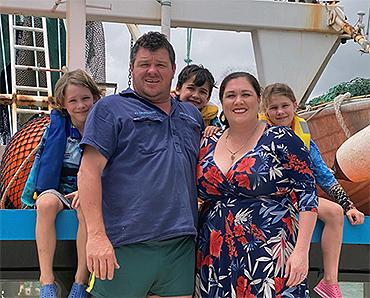Queensland fisher and Australian Rural Leadership Program graduate Kylie Dunstan says leadership and conflict resolution skills are essential to the future of commercial fishing
By Jo Fulwood
As a recent graduate of the Australian Rural Leadership Program (ARLP), run by the Australian Rural Leadership Foundation, Kylie Dunstan believes strong and conciliatory leaders with a capacity for both conflict resolution and innovation will be critical for the long-term survival of Australia’s seafood sector.

Dunstan, who received sponsorship from the FRDC, was one of 35 graduates of the 26th ARLP. She is a co-owner and partner of the Queensland-based Paulsen Fisheries with her brother Shane Paulsen. She is also head of government business with media intelligence company Isentia.
Dunstan began her professional career in the seafood sector spearheading a campaign to ensure the retention and legality of selling trawled bycatch products. She says decisions affecting the ability of the sector to operate both profitably and with community support must be based on science-backed research, made by leaders who have the support of the sector.
“There are policy decisions being made for political reasons, not because they are in the best interests of industry. Bad decisions are being made because of political expediency, which, in turn, are having a profound impact on those fishers involved,” she says.
“Our industry is full of hugely knowledgeable, passionate people, so we need to get these people into decision-making roles.”
The running of the 26th ARLP was not smooth sailing. The program began in 2019 and was disrupted by bushfires in Victoria and New South Wales in the summer of 2019-20, followed by COVID-19 travel restrictions.
Despite this, the program managed to deliver high-level personal and professional development, taking participants across Australia to experience once-in-a-lifetime leadership opportunities.
Dealing with difficult issues
“This course has had a tangible impact on me, my view of myself and how I turn up for others,” Dunstan says. “This was one of the most profound experiences of my life.”
The program forced all participants to step out of their comfort zones, encouraging learning and growth away from the noise of everyday life. It also highlighted the importance of communication, quality networks and honest conversations, particularly about issues that may not be very palatable, she says.
Her experiences from the ARLP have given her the confidence to take on more leadership roles within the seafood sector. Since her graduation from the program, she has become a safety champion for the sector.
She believes the future of Australia’s commercial seafood sector requires continued long-term investment in the capacity of sector leaders.
Community support
Dunstan highlights the sector’s reliance on social approval to operate efficiently and profitably, emphasising the importance of community support for commercial operations, no matter what they are.
She says maintaining access and fisheries rights for commercial fishers is paramount. Poor decisions by a small minority should not be tolerated, particularly if these decisions affect the ability to operate commercially in those fisheries in the future.
“We have to be having really authentic, honest conversations with industry about the need for community support. For example, there is an incredible amount of scrutiny on inshore commercial operators, such as beam trawlers in estuaries. They have to operate respectfully within their environment and in a way that is consistent with community expectations, or their ability to operate in those fisheries will not be able to continue.”
A fourth-generation sector participant, Dunstan has worked in both professional and volunteer roles in seafood organisations, including the FRDC and the Queensland Commercial Fishermen’s Organisation (now the Queensland Seafood Industry Association). She also spent 13 years in a senior management position at the Grains Research and Development Corporation.
Expressions of interest in the ARLP are now being taken. Visit rural-leaders.org.au for more information.
More information:
Australian Rural Leadership Foundation, rural-leaders.org.au, Kylie Dunstan kyliepaulsen@gmail.com





